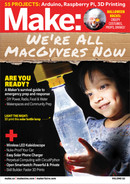
humanitarian agencies — like the Red Cross in
Kenya, the U.N.’s International Organization for
Migration in Djibouti, or Terre des Hommes in
Gaza — became part of the Maker Movement
as well by building makerspaces or FabLabs to
support their educational activities. I particularly
admire Habibi Works which supports Syrian
refugees in Greece.
The global Covid-19 pandemic brutally but
clearly made the case for the local manufacture
and supply of aid. The aid community really
struggled to operate during the pandemic. It
highlighted just how expensive, slow, and fragile
our globalized supply chains really are. Major
aid agencies started approaching us to ask for
advice on how they could 1) find and buy locally
made supplies, 2) enable local manufacturing of
aid supplies, or 3) even start to make supplies
themselves. Indeed, much of my work is
now about co-creating initiatives to help the
humanitarian sector do these three things.
Internet of Production
But the key challenge I think about now is one of
scale. A batch size of one is all that is needed to
replace a part and repair a medical device. Batch
sizes of hundreds or even thousands might be
needed by local communities or markets, even in
remote locations. But many of the aid agencies I
engage with are looking to secure stable supplies
of hundreds of thousands or even tens of millions
of often identical products. So naturally, they buy
from mass producers who are very often not local
to where these products are needed — and hence
those vulnerable, globalized supply chains are
necessary.
What if we could network together massive
numbers of makers and small manufacturers
in every place where these products are
needed to reliably deliver this supply locally,
and on demand? Ideally this would be done
within a single header contract, because most
procurement systems favor placing small
+
40 makezine.com
EMERGENCY! Think Globally, Make Locally
SUVA, FIJI: In the South Pacific, Field Ready works with local factories to introduce water and sanitation aid products
to their portfolios, replacing items imported from warehouses as far away as Western Europe. But in the Covid-19
pandemic, Laisa Meo and her colleagues at Field Ready Fiji were able to quickly pivot to making PPE.
Te Internet of
Production will connect
people to nd, make, and
share their designs,
machines, know-how,
and hardware.
Field Ready
M82_038-43_SS_Emergence_F1.indd 40M82_038-43_SS_Emergence_F1.indd 40 7/11/22 1:45 PM7/11/22 1:45 PM
..................Content has been hidden....................
You can't read the all page of ebook, please click here login for view all page.
